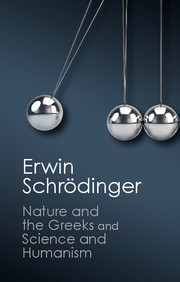Book contents
- Frontmatter
- Contents
- Foreword
- NATURE AND THE GREEKS
- Dedication
- I The motives for returning to ancient thought
- II The competition, reason v. senses
- III The Pythagoreans
- IV The Ionian Enlightenment
- V The religion of Xenophanes. Heraclitus of Ephesus
- VI The Atomists
- VII What are the special features?
- Bibliography
- SCIENCE AND HUMANISM
VII - What are the special features?
Published online by Cambridge University Press: 05 October 2014
- Frontmatter
- Contents
- Foreword
- NATURE AND THE GREEKS
- Dedication
- I The motives for returning to ancient thought
- II The competition, reason v. senses
- III The Pythagoreans
- IV The Ionian Enlightenment
- V The religion of Xenophanes. Heraclitus of Ephesus
- VI The Atomists
- VII What are the special features?
- Bibliography
- SCIENCE AND HUMANISM
Summary
Let me now, at last, approach the answer to the question which was put at the outset.
Remember the lines of Burnet's preface—that science is a Greek invention; that science has never existed except among peoples who came under Greek influence. Later in the same book he says: ‘The founder of the Milesian School and therefore [!] the first man of science was Thales.’ Gomperz says (I quoted him extensively) that our whole modern way of thinking is based on Greek thinking; it is therefore something special, something that has grown historically over many centuries, not the general, the only possible way of thinking about Nature. He sets much store on our becoming aware of this, of recognizing the peculiarities as such, possibly freeing us from their wellnigh irresistible spell.
What are they then? What are the peculiar, special traits of our scientific world-picture?
About one of these fundamental features there can be no doubt. It is the hypothesis that the display of Nature can be understood. I have touched on this point repeatedly. It is the non-spiritistic, the non-superstitious, the non-magical outlook. A lot more could be said about it. One would in this context have to discuss the questions: what does comprehensibility really mean, and in what sense, if any, does science give explanations?
- Type
- Chapter
- Information
- 'Nature and the Greeks' and 'Science and Humanism' , pp. 90 - 98Publisher: Cambridge University PressPrint publication year: 2014



